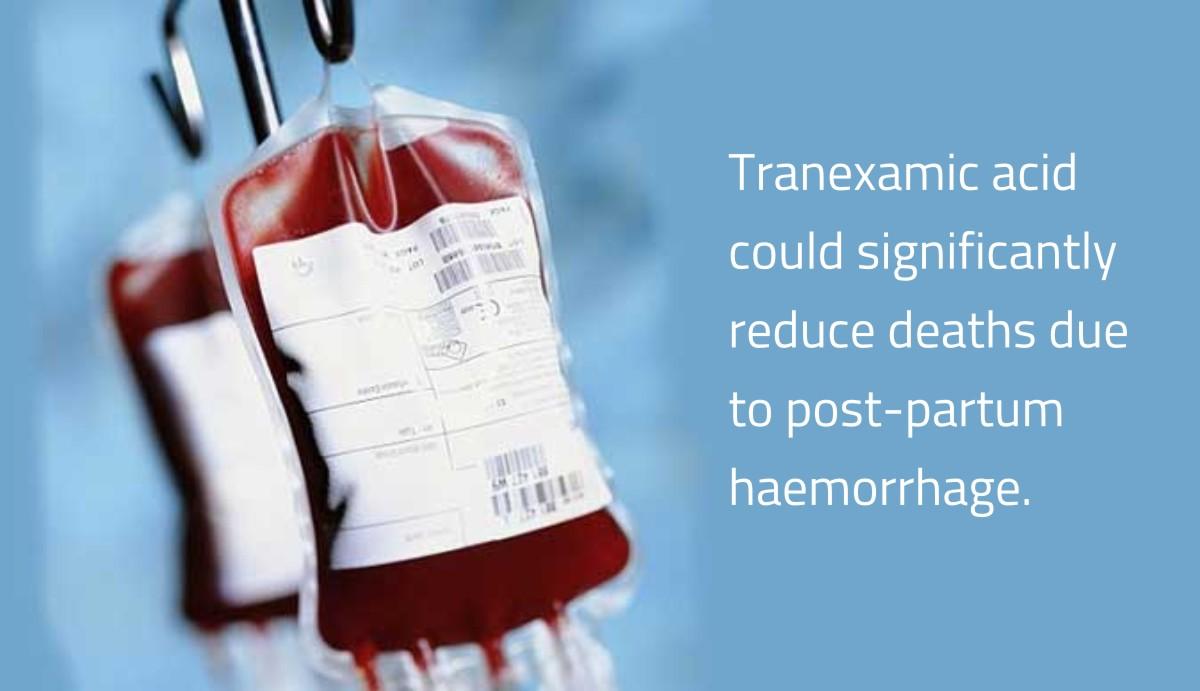
Maternal mortality continues to be a significant challenge across the developing countries and particularly relevant to India. Post-partum haemorrhage is the leading cause of maternal death. Tranexamic acid is a widely available and inexpensive drug which is routinely used for trauma patients to reduce death due to bleeding.
Outcome of a large trial was published in the highly reputed “The Lancet” journal[1] which assessed the impact of early administration of tranexamic acid to women with post-partum haemorrhage on mortality, hysterectomy and other relevant outcomes. The study concluded that giving this tranexamic acid significantly reduces maternal deaths and if given within the first 3 hours of start of bleeding may reduce up-to a third of all related deaths.
Tranexamic acid belongs to a class of drugs called antifibrinolytic. It works by preventing blood clots from breaking down too quickly. This helps to reduce excessive bleeding[2].
The study conducted between March 2010, and April, 2016 involved 20 060 women aged 16 years and older with a post-partum haemorrhage after a vaginal birth or caesarean section done in 193 hospitals in 21 countries. Half the women were given tranexamic acid while the other half were given a placebo. Death in the tranexamic acid group significantly reduced to 1.5% as compared to 1.9% in the placebo group. The impact was more pronounced in the women who received the intervention within 3 hours of childbirth (1.2% in the tranexamin group versus 1.9% in the placebo group). No other adverse effects were observed in the tranexamic acid group.
The authors concluded “The administration of tranexamic acid to women with post-partum haemorrhage reduces deaths due to bleeding and laparotomy to control bleeding with no evidence of any adverse effects or complications. When given soon after delivery, tranexamic acid reduces death due to bleeding by nearly one third.”
To establish the role of tranexamic acid in PPH was an active research question even for WHO[3]. Though the drug was already part of the recommendations, with the current study, the recommendations have backing of a strong evidence. In addition, the current study puts tranexamic acid as a candidate for the frontline management rather than to be used as in more difficult cases such as persistent bleeding.
Neither does the “FOGSI guidelines on Prevention of Post Partum Hemorrhage (PPH ) - Consensus Statement for Prevention of PPH (2014)” nor does the Maternal Health Division nor the “Guidelines for Pregnancy Care and Management of Common Obstetric Complications by Medical Officers” by the Department of Family Welfare Ministry of Health & Family Welfare Government of India (2005) mention the use of tranexamic acid. Considering the availability of high quality evidence in favour of the drug, it is the right time to evaluate the role of the drug in management of PPH in Indian settings and if found useful, expedite the process of universal adoption.
There are several reasons why the findings of this study are very significant. This drug costs as low as Rs. 180 in market and is routinely used for management of trauma. We are already struggling to make enough safe blood available through the length and breadth of the country. Though the authors have not explored the impact of tranexamic acid on reducing the overall blood requirement, by reducing bleeding, tranexamic acid is likely to lead to reduced number of blood transfusions.
While the country takes the strides forward to increase the availability of voluntarily donated blood, we must embrace all means possible to safely reduce the requirement of allogenic blood. As is often said in blood transfusion medicine 'no transfusion is safe the risks can only be minimised', we need to get into an aggressive mode to consider and adopt all available means to lead to conservative and rational use of blood.
References:
- WOMAN Trial Collaborators. Effect of early tranexamic acid administration on mortality, hysterectomy, and other morbidities in women with post-partum haemorrhage (WOMAN): an international, randomised, double-blind, placebo-controlled trial. Lancet Lond Engl. 2017 Apr 26
- Tranexamic acid [Internet]. Drugs.com; Available from: https://www.drugs.com/cdi/tranexamic-acid.html
- WHO recommendations for the prevention and treatment of postpartum haemorrhage. [Internet]. Available from: PDF Link
